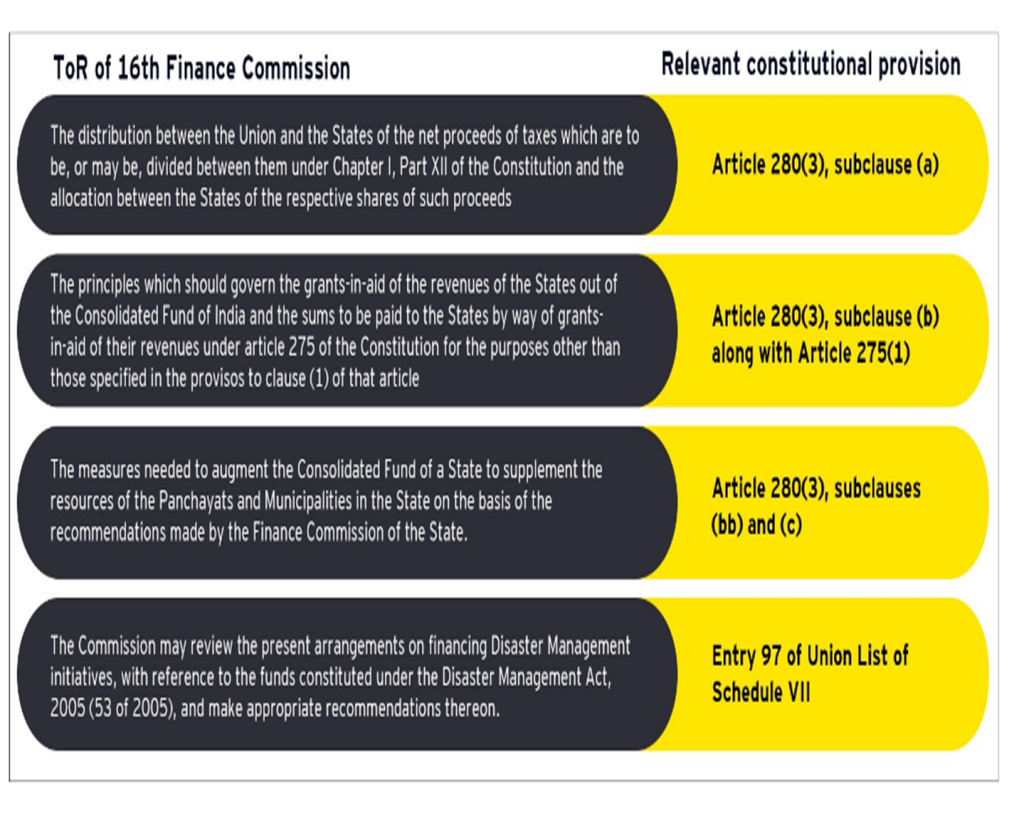SYLLABUS
Gs2; Appointment to various Constitutional posts, powers, functions and responsibilities of various Constitutional Bodies.
Context:
Recently, the Sixteenth Finance Commission submitted its report for the award period from 2026-27 to 2030-31 to the President of India.
About the Sixteenth Finance Commission
- The Sixteenth Finance Commission (XVIFC) was constituted by the President of India in pursuance of clause (1) of Article 280 of the Constitution.
- The 16th FC, headed by Chairman Dr. Arvind Panagariya.
- Members of the XVIFC, Smt. Annie George Mathew, Dr. Manoj Panda, Shri T. Rabi Sankar and Dr. Soumyakanti Ghosh, and the Secretary to the XVIFC, Shri Ritvik Pandey, accompanied the Chairman.
- As per the Terms of Reference (TOR), the XVIFC was mandated to submit a report covering a five-year period commencing on the 1st day of April, 2026, making recommendations on:
- Distribution of the net proceeds of taxes between the Union and the States.
- Allocation among the States of their respective shares of such proceeds.
- Grants-in-aid to States
- Review of arrangements for financing Disaster Management initiatives, among other matters.
- The report will be made public once it is tabled in Parliament by the Union Finance Minister under Article 281 of the Constitution.
About the Finance Commission
- Article 280 of the Constitution of India provides for a Finance Commission as a quasi-judicial body.
- It is constituted by the president of India every fifth year or at such earlier time as he considers necessary.
- The First Finance Commission was constituted vide Presidential Order under the chairmanship of Shri K.C. Neogy on 6th April 1952.
- It consists of a chairman and four other members to be appointed by the president.
- The Chairman of the Commission shall be selected from among persons who have had experience in public affairs.
- The four other members shall be selected from among persons who have experience as a High Court Judge, knowledge of government finances, extensive financial or administrative experience, or expertise in economics.
- Term of Office and Reappointment: Members serve for a term specified by the President and can be reappointed. They can resign by writing to the President.
- Procedure and Powers: The Commission sets its procedures and has civil court powers, including summoning witnesses, requiring documents, and accessing public records. It can demand information relevant to its duties and is considered a civil court for certain legal purposes.
- The Finance Commission determines two key aspects:
- Vertical Devolution: how much of the Centre’s tax revenue should be shared with all States.
- Horizontal Devolution: How this amount is divided among individual States. The distribution between States is usually based on factors like population, income, and geography, but the overall share given to all States is not based on any specific formula.
- The 13th, 14th, and 15th Commissions recommending 32%, 42%, and 41% of funds, respectively. Additionally, the Centre may provide extra grants to States for joint schemes.

Sources:
Bussiness standard
PIB
Ani News

